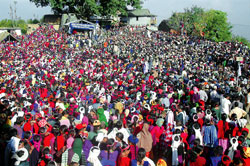 Twenty-five-year-old Rajendra has been living in Surkhet for the past year after fleeing his native Dailekh.
Twenty-five-year-old Rajendra has been living in Surkhet for the past year after fleeing his native Dailekh. His wife was a key activist who led the anti-Maoist uprising in Dullu in November 2004 (see: NT, 'We couldn't take it anymore', # 223). But the Maoists retaliated harshly against the activists for daring to oppose them.
Rajendra's wife, who was then pregnant, his father and himself, were all abducted for periods ranging from five days to one month. A cousin was murdered for being an informant. Ratna is also from Dailekh and has a catch in her throat each time she tries to open her mouth to share her experience. Her eyes are dark pools of deep pain that gave out more than words ever could.
The Dailekh uprising (see pic) was seen by many as a milestone: for the first time the people had said enough to Maoist atrocities and despite the fear of reprisal stood up to the rebels. Rajendra and Ratna remember those days well. The behaviour of the rebels was getting unbearable: being forced to cook food for the militia, running errands, extortion. One day the body of a local person said to be killed by the security forces was thrown into a ditch. The soldiers didn't remove it, and the Maoists spread word that the body was booby-trapped.
Finally, in desperation women family members of the deceased retrieved the body. The Maoists then covered it with their red banner-at which the outraged women began throwing stones at the rebels. Everyone joined in and the Maoists were driven out of the village. The security forces and the local administration encouraged the locals of Dullu to organise themselves into vigilante groups. Sure enough, the Maoists reacted and killed some members of the resistance. Rajendra and his family had no choice but to flee for their lives.
Even after 12 years, the motorable road is graveled only up to Chupra, after which there was only a dirt road up to Dailekh Bajar. As we bump along, the surrounding hillsides are ablaze with rhododendron. Higher up, there are orchids dangling from trees along the road. It is hard to believe there is a nasty war going on in such a beautiful place.
Along the road we pass scanty teashops, women carrying backbreaking loads of fodder or weary travelers. There is neglect and misery etched on their faces. The district capital is like an army base: checkpoints and barbed wires all around. The town itself is overcrowded and squalid to the internally displaced and lack of services.
The government's apathy, fear and neglect is in complete contrast to the energy and commitment of civil society. Everyone of the NGOs we met were doing what they could under difficult circumstances to empower the people and build local capacity.
They could still do a lot in peace-building, but they were taking care of the basic requirements of those most
in need.
One can only marvel at the innate Nepali capacity to survive and adapt despite all odds. There are signs everywhere of a people who have been abandoned by their government: the lack of health care, the abject poverty, the failure to blacktop a lifeline highway even after 12 years.
But it's not the war that is killing Dailekh, it is neglect and irresponsibility of those who wield power. Rajendra is homeless and displaced, living far away from his home village. The power struggle in Kathmandu, the royal audiences in Pokhara and the party-Maoist talks in New Delhi may as well be happening on another planet.
Rajendra has found work with the Community for Peace Program supported by Cedpa/Nepal which helps displaced youths and peace centers that provide counseling services and skills and a monthly stipend of up to Rs 1,500. Rajendra's family manages primarily on his income and odd jobs working on someone's farm or selling vegetables. Ratna has not fully recovered from her ordeal.
The families in Surkhet yearn for their fields and homes in the mountains. There are many more families like Rajendra's and Ratna's in Surkhet and across Nepal. Most districts like Dailekh just need roads and an end to the conflict so the people can innovate and improvise. Not ensuring this means the state and all who have held their share of power in it are silent allies to abuse and even murder of their fellow countrymen. The 12-year neglect of Dailekhis screaming to be heard.
All names have been changed to protect identities.


